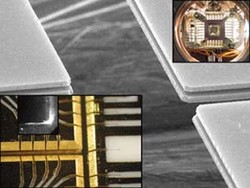 The Teaching programme
The Teaching programme
To
be an effective and stimulating teacher of physics in schools you need
to have a depth and breadth of knowledge in your subject and an ability
to communicate it to young people in both a theoretical and a practical
setting. You need also to be aware of physics as one branch of
increasingly connected science ("broad science") and to be aware of
where your subject is a part of science and society issues. This
programme therefore emphasises interdisciplinary links and emphasises
opportunities for you to communicate your growing appreciation of the
subject. The close partnership which has developed between the Sussex
School of Education and the Sussex Chemistry and Physics Departments
will enable pre-ITT students on the Course to engage both with cutting
edge developments in physics and physical techniques and with the wider
"science in context" requirements of current school science programmes.
By the end of the course, we hope that you will be able to:
- demonstrate a sound knowledge of core aspects of physics
- show a high level of competence at practical physics;
- explain conceptual models of the character and behaviour of matter and radiation at successively deeper levels of sophistication;
- discuss aspects of physics in the applied worlds of commerce, the environment and space;
- appreciate some of the landmarks in the history of physics.
You will then be ready to train as an effective, challenging and up-to-date teacher of your subject, confident with school level material and able to inspire pupils to pursue science at stimulating and ever higher levels. The University of Sussex is well known as a successful provider of Initial Teacher Training. Our PGCE and GTP science courses are highly rated, both by OFSTED and by participants. In addition, the Training and Development Agency for Schools (TDA) has funded our science support courses and "booster" courses, which focus on conceptually difficult areas. These have enabled a range of students over several years to redress gaps in their scientific knowledge and proceed successfully to teacher training. It was from this background that the TDA selected Sussex as one of two universities in the UK to pilot a Chemistry Enhancement course in 2005 and 2006. We are now funded to offer our successful model in a Physics Enhancement Course in addition.
Most students have found our Enhancement Courses demanding but very enjoyable and rewarding. They are taught mostly by science tutors from the Sussex School of Education and partly by staff from the Department of Physics. Our newly furnished initial teacher education suite is located in the Physics and Astronomy and Chemistry Departments building so that we benefit from all their sophisticated and state-of-the-art equipment and expertise as well as our own education resources. The teaching - and learning - is through a mixture of seminars, laboratory practicals and workshops combined with independent study and group work. This encourages you to be active and to learn from one another. It assists in the development of critical thinking, decision making and problem solving skills and provides a useful foundation for teacher training.
Learning Objectives and Syllabus Details
Our Physics Enhancement Course is formally divided into six major
modules but there will be overlap between them to ensure deep learning
of connections and consequences. The modules cover the major areas of
physics and astrophysics under the labels of Molecular Theory, Mechanics, Electricity and Magnetism, More Waves and Fields, Quantum & Relativistic Phenomena, Astronomy and Cosmology
. There will be considerable weighting within these topics on
developing your practical experience and skills. Alongside these
modules will be an on-going programme to advance your mathematical and
IT skills. Over a period of six months, we will be able to visit most
major areas of physics and astrophysics and electronics, view some of
their connections with science in general, and find time to debate some
related current science and society issues. From whatever level you
start, you will be surprised at how much further you can take your
appreciation, knowledge and understanding of Physics. View the Course Content for more details of the topics.
Assessment
Assessment is tuned to the adage
that to know something is to be able to teach it. Assessments will
therefore be linked to presentations and demonstrations of theoretical,
interdisciplinary and practical aspects of physics, as well as to
traditional, knowledge-based testing. With the very varied experience
and achievement in Physics expected amongst our students, this
combination of presenting and communicating the subject should work
effectively and it has given previous Enhancement Course students the
confidence they have needed to know that they really are "enhanced".
Student Support
The University has a
Student Advisor system. Student Advisors are designated to work with
students in each School. Student Advisors are available by appointment
or at publicised drop-in times, and are responsible for the overall
welfare and progress of all students registered for programmes with the
Schools. They can help with personal difficulties, for instance
financial, welfare, homesickness, housing and health problems. A key
part of their role is to ensure that support requirements for disabled
students are met within the School. The Course teachers will see the
group for a significant part of each week and so have knowledge of each
of your circumstances and progress. Other Education Department Science
Curriculum Tutors are experienced in this area through their
involvement in Initial Teacher Education programmes. They will also be
available for consultation and advice, and to help assess your progress
across each component of the programme and to give advice on
preparation for your ITT year. On line tutor support will be available,
and the Course Leader will also be available by telephone at any time.
Beyond these levels, the full panoply of the University Student Welfare
system is available to Enhancement Course students.